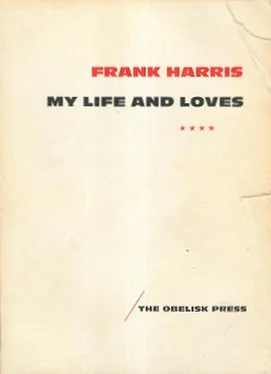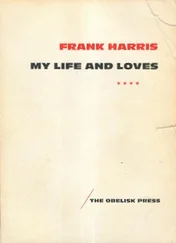Frank Harris - My Life and Loves, Book 1
Здесь есть возможность читать онлайн «Frank Harris - My Life and Loves, Book 1» весь текст электронной книги совершенно бесплатно (целиком полную версию без сокращений). В некоторых случаях можно слушать аудио, скачать через торрент в формате fb2 и присутствует краткое содержание. Жанр: Эротика, Секс, на английском языке. Описание произведения, (предисловие) а так же отзывы посетителей доступны на портале библиотеки ЛибКат.
- Название:My Life and Loves, Book 1
- Автор:
- Жанр:
- Год:неизвестен
- ISBN:нет данных
- Рейтинг книги:4 / 5. Голосов: 1
-
Избранное:Добавить в избранное
- Отзывы:
-
Ваша оценка:
- 80
- 1
- 2
- 3
- 4
- 5
My Life and Loves, Book 1: краткое содержание, описание и аннотация
Предлагаем к чтению аннотацию, описание, краткое содержание или предисловие (зависит от того, что написал сам автор книги «My Life and Loves, Book 1»). Если вы не нашли необходимую информацию о книге — напишите в комментариях, мы постараемся отыскать её.
My Life and Loves, Book 1 — читать онлайн бесплатно полную книгу (весь текст) целиком
Ниже представлен текст книги, разбитый по страницам. Система сохранения места последней прочитанной страницы, позволяет с удобством читать онлайн бесплатно книгу «My Life and Loves, Book 1», без необходимости каждый раз заново искать на чём Вы остановились. Поставьте закладку, и сможете в любой момент перейти на страницу, на которой закончили чтение.
Интервал:
Закладка:
«Aye, aye!» ejaculated Whitman from time to time while his clear grey eyes absorbed all that I said. I went on to assure him that Smith had a profound admiration for him (Whitman), thought him the greatest American poet and regretted deeply that he was not well enough to come out that night and make his personal acquaintance. «I'm sorry, too,» said Whitman slowly, «for your friend Smith must have something large in him to be so interested in Paine and me.» Perfectly simple and honest Walt Whitman appeared to me, even in his self-estimate an authentic great man! I had nothing more to say, so hastened home to show Smith Whitman's boyish signature and to give him a description of the man. The impression Whitman left on me was one of transparent simplicity and sincerity: not a mannerism in him, not a trace of affectation, a man simply sure of himself, most careful in speech, but careless of appearance and curiously, significantly free of all afterthoughts or regrets. A new type of personality which, strangely enough, has grown upon me more and more with the passing of the years and now seems to me to represent the very best in America, the large unruffled soul of that great people manifestly called and chosen to exert an increasingly important influence on the destinies of mankind.
I would die happily if I could believe that America's influence would be anything like as manful and true and clear-eyed as Whitman's in guiding humanity; but alas!… It would be difficult to convey to European readers any just notion of the horror and disgust with which Walt Whitman was regarded at that time in the United States on account merely of the sex poems in Leaves of Grass. The poems to which objection could be taken don't constitute five per cent of the book, and my objection to them is that in any normal man love and desire take up a much larger proportion of life than five per cent. Moreover, the expression of passion is tame in the extreme. Nothing in Leaves of Grass can compare with half a dozen passages in the Songs of Solomon: think of the following verse: I sleep, but my heart waketh: it is the voice of my beloved that knocketh, saying, Open to me, my sister, my love, my dove, my undefiled: for my head is filled with dew, and my locks with the drops of the night… My beloved put in his hand by the hole of the door, and my bowels were moved for him. And then the phrases: «her lips are like a thread of scarlet… her love like an army with banners,» but American Puritanism is more timid even than its purblind teachers.
It was commonly said at the time that Whitman had led a life of extraordinary self-indulgence: rumor attributed to him half a dozen illegitimate children and perverse tastes to boot. I think such statements exaggerated or worse: they are no more to be trusted than the stories of Paine's drunkenness. At any rate, Horace Traubellft later declared to me that Whitman's life was singularly clean, and his own letter to John Addington Symonds must be held to have disproved the charge of homosexuality. But I dare swear he loved more than once not wisely but too well, or he would not have risked the reprobation of the unco guid. In any case, it is to his honor that he dared to write plainly in America of the joys of sexual intercourse. Emerson, as Whitman himself tells us, did his utmost all one long afternoon to dissuade him from publishing the sex-poems, but fortunately all his arguments served only to confirm Whitman in his purpose. From certain querulous complaints later, it is plain that Whitman was too ignorant to gauge the atrocious results to himself and his reputation of his daring, but the same ignorance that allowed him to use scores of vile neologism in this one instance stood him in good stead. It was right of him to speak plainly of sex; accordingly he set down the main facts, disdainful of the best opinion of his time. And he was justified; in the long run it will be plain to all that he thus put the seal of the Highest upon his judgment. What can we think, and what will the future think, of Emerson's condemnation of Rabelais, whom he dared to liken to a dirty little boy who scribbles indecencies in public places and then runs away, and his contemptuous estimate of Shakespeare as a ribald playwright, when in good sooth he was «the reconciler» whom Emerson wanted to acclaim and had not the brains to recognize? Whitman was the first of great men to write frankly about sex and five hundred years hence that will be his singular and supreme distinction. Smith seemed permanently better, though, of course, for the moment disappointed because his careful eulogy of Paine never appeared in the Press, so one day I told him I'd have to return to Lawrence to go on with my law work, though Thomson, the doctor's son, kept all my personal affairs in good order and informed me of every happening. Smith at this time seemed to agree with me, though not enthusiastically, and I was on the point of starting when I got a letter from Willie, telling me that my eldest brother, Vernon, was in a New York hospital, having just tried to commit suicide, and I should go to see him. I went at once and found Vernon in a ward in bed. The surgeon told me that he had tried to shoot himself and that the ball had struck the jaw-bone at such an angle that it went all round his head and was taken out just above his left ear: «It stunned him and that was all; he can go out almost any day now.»
The first glance showed me the old Vernon. He cried, «Still a failure, you see, Joe: could not even kill myself, though I tried!» I told him I had renamed myself Frank; he nodded amicably, smiling.
I cheered him up as well as I could, got lodgings for him, took him out of the hospital, found work for him, too, and after a fortnight saw that I could safely leave him. He told me that he regretted having taken so much money from my father: «Your share, I'm afraid, and Nita's, but why did he give it to me? He might just as well have refused me years ago as let me strip him, but I was a fool and always shall be about money. Happy go lucky, I can take no thought for the morrow.» That fortnight showed me that Vernon had only the veneer of a gentleman; at heart he was as selfish as Willie but without Willie's power of work. I had overestimated him wildly as a boy, thought him noble and well read; but Smith's real nobility, culture and idealism showed me that Vernon was hardly silver-gilt. He had nice manners and good temper and that was about all. I stopped at Philadelphia on my way to Lawrence just to tell Smith all I owed him, which the association with Vernon had made clear to me. We had a great night and then for the first time he advised me to go to Europe o study and make myself a teacher and guide of men. I assured him he overestimated me because I had an excellent verbal memory, but he declared that I had unmistakable originality and fairness of judgment, and above all, a driving power of will that he had never seen equaled. «Whatever you make up your mind to do,» he concluded,
«you will surely accomplish, for you are inclined to under-rate yourself.» At the time I laughed, saying he didn't even guess at my unlimited conceit, but his words and counsel sank into my mind and in due course exercised a decisive, shaping influence on my life. I returned to Lawrence, put up a sofa-bed in my law room and went to the Eldridge House nearby for my meals. I read law assiduously and soon had a few clients, «hard cases» for the most part, sent to me, I found, by Judge Stephens and Barker, eager to foist nuisances on a beginner. An old mulatto woman kept our offices tidy and clean for a few dollars monthly from each of us, and one night I was awakened by her groans and cries. She lived in a garret up two flights of stairs and was evidently suffering from indigestion and very much frightened, as colored folk are apt to be when anything ails them.
«I'm gwine to die!» she told me a dozen times. I treated her with whisky and warm water, heated on my little gas-heater, and sat with her till at length she fell asleep. She declared next day I had saved her life and she'd never forget it. «Nebber, fo' sure!» I laughed at her and forgot all about it. Every afternoon I went over to Liberty Hall for an hour or so to keep in touch with events, though I left the main work to Will Thomson. One day I was delighted to find that Bret Harte was coming to lecture for us: his subject: «The Argonauts of '49.» I got some of his books from the bookstore kept by a lame man named Crew, I think, on Massachusetts Street, and read him carefully. His poetry did not make much impression on me-mere verse, I thought it; but The Outcasts of Poker Flat and other stories seemed to me almost masterpieces in spite of their romantic coloring and tinge of melodrama. Especially the description of Oakhurst, the gambler, stuck in my mind: it will be remembered that when crossing the «divide,» Oakhurst advised the party of outcasts to keep on traveling till they reached a place of safety. But he did not press his point: he decided it was hopeless, and then came Bret Harte's extraordinary painting phrase: «Life to Oakhurst was at best an uncertain sort of game and he recognized the usual percentage in favor of the dealer.»
Читать дальшеИнтервал:
Закладка:
Похожие книги на «My Life and Loves, Book 1»
Представляем Вашему вниманию похожие книги на «My Life and Loves, Book 1» списком для выбора. Мы отобрали схожую по названию и смыслу литературу в надежде предоставить читателям больше вариантов отыскать новые, интересные, ещё непрочитанные произведения.
Обсуждение, отзывы о книге «My Life and Loves, Book 1» и просто собственные мнения читателей. Оставьте ваши комментарии, напишите, что Вы думаете о произведении, его смысле или главных героях. Укажите что конкретно понравилось, а что нет, и почему Вы так считаете.










